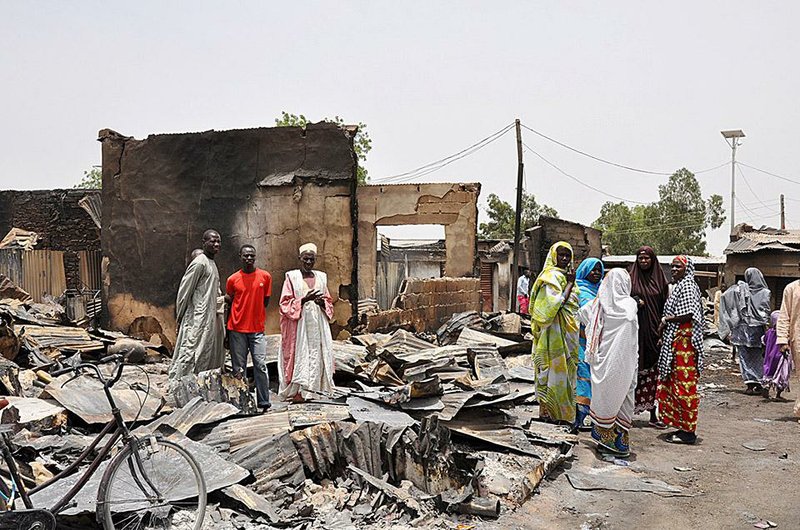MAIDUGURI, Nigeria -- Thousands of members of Nigeria's home-grown Islamic extremist Boko Haram group strike across the border in Cameroon, with coordinated attacks on border towns, a troop convoy and a major barracks.
Farther north, Boko Haram employs recruits from Chad to enforce its control in northeastern Nigerian towns and cities.
In Niger, the government has declared a humanitarian crisis and appealed for international aid to help tens of thousands of Nigerian refugees driven from their homes by the insurgency.
Neighboring countries are increasingly being drawn into Nigeria's Islamic uprising. Thousands of people have been killed in Nigeria's five-year insurgency, and some 1.6 million people have been driven from their homes.
"We are concerned about the increasing regionalization of Boko Haram," said Comfort Ero, Africa director for the International Crisis Group.
On Sunday, Cameroon's army announced it had broken up a Boko Haram training camp in the Mayo-Danay district in the country's Far North region. The army was looking for other hideouts in the area, said Jean-Pierre Mbida, a soldier with the Rapid Intervention Battalion tasked with fighting the insurgents.
"We will continue monitoring the area in the hope of uncovering any other Boko Haram hideouts and training grounds," he added.
Ero cautioned that cooperation between the neighboring countries is weak.
"None of the sides is willing to share information with the other," Ero said.
She said there is also distrust of the capabilities of Nigeria's once-proud military, which has been battered by Boko Haram. A court-martial last week sentenced 54 soldiers to death by firing squad for refusing to fight the extremists.
Chad responded last week by opening a regional "counterterrorism cell" against Boko Haram in N'Djamena, Chad's capital 40 miles from the Nigerian border, said an adviser to French Defense Minister Jean-Yves Le Drian.
Boko Haram's threat to neighboring countries was highlighted Wednesday, when some 5,000 insurgents launched simultaneous attacks on border towns in Cameroon, using a roadside improvised explosive device and attacking the main border barracks, Cameroon's Ministry of Defense said.
Cameroonian troops repelled the attacks and killed 116 militants while losing a sergeant and a lieutenant, the Ministry of Defense said, adding that Boko Haram must have suffered additional casualties on the Nigerian side caused by Cameroonian artillery fire.
Citizens from Chad, Niger and Cameroon long have been identified among Boko Haram fighters in Nigeria. But residents fleeing Boko Haram now report that Chadian recruits are enforcing the militant group's rule in northeast Nigerian border towns in Borno state. People who escaped from Gajigana village, which was attacked a week ago, said fighters they called "Chadian mercenaries" have taken charge of most communities, even sitting in courts to adjudicate local disputes.
"They monitor every movement, all the things we do, the kind of people you meet with," said Kalli Abdullahi, who escaped to Maiduguri last week.
Nigerian government officials confirm that Boko Haram controls 12 of 27 local government areas in Borno state, as well as some in Adamawa and Yobe states. And they long have had camps in Chad, Cameroon and Niger, experts say.
The area where the four countries' borders meet has long been ignored by governments. High unemployment means there are groups of disgruntled youths who are an easy target for Boko Haram recruitment. Across borders, people often belong to the same tribe and speak the same local languages. Boko Haram offers signing bonuses and monthly pay to those who join, residents say.
A video released late Saturday by Boko Haram shows gunmen mowing down civilians lying face down in a dorm, with a leader saying they are being killed because they are "infidels" or nonbelievers.
Most of the killed appear to be adult men.
"We have made sure the floor of this hall is turned red with blood, and this is how it is going to be in all future attacks and arrests of infidels," the group leader says in a message.
The video released to journalists came two days after fleeing villagers reported that the extremists were rounding up elderly people and killing them in two schools in Gwoza, in northeast Nigeria.
The setting of the latest video appears to be a school, a long dormitory furnished with bunk beds that the leader says is in Bama, a town 40 miles north of Gwoza. Students and schools are frequently targeted by Boko Haram, which means "Western education is sinful" in the Hausa language.
In the video, the leader notes that the Prophet Muhammad advised that prisoners should be held, not killed, but that "we felt this is not the right time for us to keep prisoners; that is why we will continue to see that the grounds are crimsoned with the flowing blood of prisoners."
Information for this article was contributed by Jamey Keaten, Divine Ntaryike and Haruna Umar of The Associated Press.
A Section on 12/22/2014

